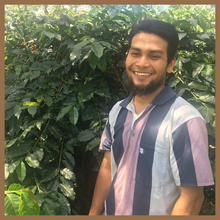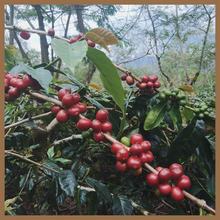| Farm | Bener Meriah Farmer Group |
| Origin | Tingkem, Aech |
| Varietals | Typica, Red Caturra & Tim Tim |
| Altitude | 1,100 - 1,450 masl |
| Process | Semi Washed / Giling Basah |
| Cup Score | 84 |
| Cup Profile: Plum, smokey, sweet tobacco, tamarind & dark chocolate. |
|
More Details:
The average farm size in is small, just one to five hectares across the country and different varietals can often be found growing together. Sumatran coffees are mainly produced by a unique semi-washed process which is sometimes described as "wet-hulled" and is known locally as Giling Basah. In this process the coffee is picked, machine pulped (usually on the individual small holding) and then partly sun dried. The parchment is then removed revealing a whitish coloured, swollen green bean when the moisture content is around 30%. The drying is then completed where the seed quickly turns to a dark green colour unique to Sumatra. |




